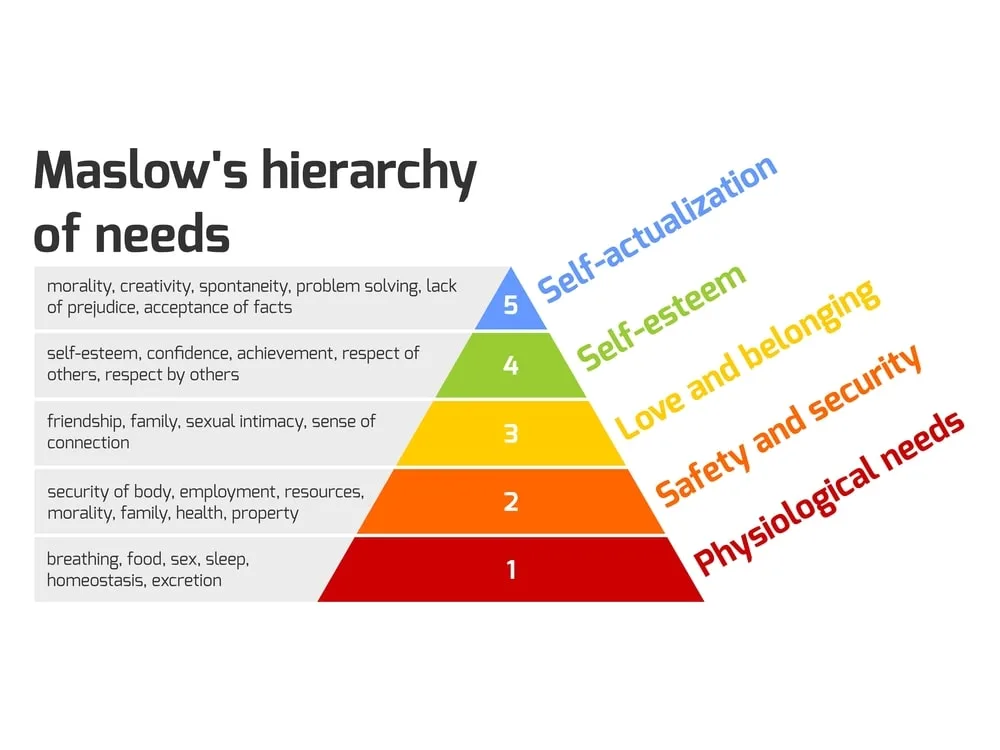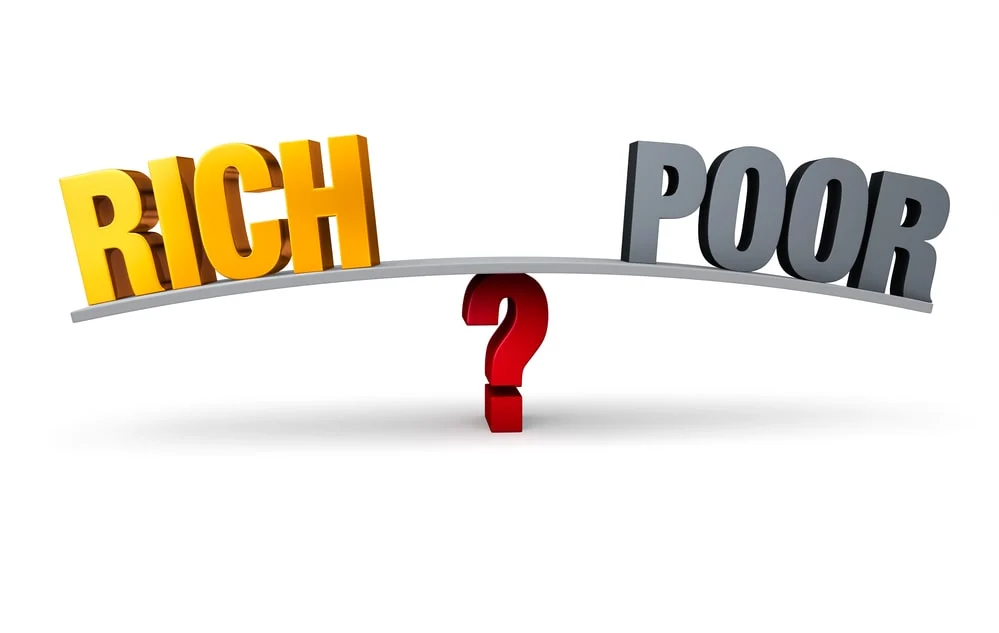When it comes to rich vs poor, there are a lot of common misconceptions and stereotypes.
In reality, every person is different, and there are many factors at play when evaluating one’s level of wealth. However, there are some general differences between the rich and the poor that may help to explain why one group tends to be wealthier than the other. So let’s take a look!
Table of Contents
What Does It Mean to Be Rich?
There is no one-size-fits-all answer to this question, as rich can mean different things to different people. Generally speaking, rich people have more money and assets than average people. They may also have a higher social status or a more luxurious lifestyle.
There are many different ways to become rich. Some people inherit their wealth, while others earn it through hard work.
What Does It Mean to Be Poor?
Again, there is no one-size-fits-all answer to this question. However, most people would agree that being poor generally means having less money and fewer assets than the average person. It can also mean having a lower social status or a more difficult life situation.
There are many different reasons why someone might be poor. For example, some people may be born into poverty or have limited access to resources to better their financial situation, while others may fall on hard times due to unforeseen circumstances such as the loss of a job, medical costs, inflation, repair costs, and more.
Maslow’s Hierarchy of Needs
Maslow’s Hierarchy of Needs is a theory proposed by psychologist Abraham Maslow that explains how humans are motivated to satisfy certain needs. The pyramid-shaped hierarchy includes five levels, with the most basic needs at the bottom and the more complex at the top.
The first level of the pyramid is physiological needs, which includes things like food, water, and sleep. The fifth level is a self-actualization need, which refers to the desire to achieve one’s full potential.
This theory relates to the rich vs poor conversation because it can help to explain why some individuals have difficulty improving their financial situation. People focused on satisfying their physiological needs (e.g., food, water, shelter) are less likely to have the energy, motivation, or resources to focus on improving their financial situation.
However, people who have satisfied most of their physiological needs and moved up to the higher levels of the pyramid (e.g., self-esteem, love/belonging, esteem) may be in a better position to invest in their education, training, or seek out opportunities that bring in more income.

Differences Between Rich and Poor
There are a few differences between poor vs. rich people and how they view or approach their finances.
Rich vs Poor Mindset
One of the key differences between rich vs poor is their mindset regarding money. Rich people often have a more positive and proactive attitude towards money, while poor people often have a more negative and reactive attitude.
Rich people are more likely to see money as a tool that can be used to achieve their goals, while poor people are more likely to see money as a source of stress and anxiety.
Relationships
Another key difference between rich and poor is their relationship with money. Rich people often see money as a positive thing. With an income surplus, rich individuals can make plans that satisfy wants and needs higher up on Maslow’s Hierarchy, such as education, buying new things, making home improvements, travel, etc. Poor individuals often view money negatively due to either just breaking even at the end of the month or being financially in the red. They may not be able to buy new things, invest in education or their future, and potentially worry about paying their debts and putting food on the table.
This difference in perspective can lead to different behaviors in terms of money. For example, rich people are more likely to be proactive with their finances, while poor people are more likely to be reactive. Proactivity often leads to better financial outcomes, while reactivity often leads to negative consequences such as missed opportunities, overspending, and debt.
Stereotypes
Some stereotypes are often associated with rich and poor individuals.
Rich people are often seen as selfish, greedy, and materialistic. On the other hand, poor people are often seen as lazy, uneducated, and dependent on government assistance.
One’s financial situation results from an abundance of factors and generalizing rich people as selfish and poor people as lazy is largely inaccurate. There are rich people who are generous and poor people who are hardworking. There is no all-encompassing fact of behaviors and characteristics of rich and poor individuals.

10 Habits of Rich or Wealthy Individuals
There are certain habits that rich people often adopt to increase their wealth.
They include:
1. They live below their means. Rich people know the importance of spending less than they earn. They can save more money and invest it in assets that generate income by doing this.
2. They invest in themselves. Rich people are often constantly learning and investing in themselves. They know that education and personal development are key to achieving their goals.
3. They are disciplined with their money. Rich people don’t spend frivolously. Instead, they save and invest their money in assets that will grow over time.
4. They have a positive mindset. Rich people are often optimistic and believe that they can achieve anything they set their minds to. They know that money is a tool that can help them reach their goals.
5. They network with other rich people. Rich people know that it’s important to associate with others with similar goals and aspirations. By networking with other rich people, they can learn from their experiences and create new opportunities.
6. They are creative with their money. Rich people know that it’s wise to be innovative with their money. So they think outside the box and develop unique ways to make more money and grow their wealth.
7. They are patient. Rich people know that it’s essential to be patient when it comes to money. They understand that wealth doesn’t happen overnight, and it takes time and effort to accumulate wealth.
8. They have a solid financial plan. Rich people know the importance of having a solid financial plan. By creating a plan, they can track their progress and stay on track to reaching their goals.
9. They are risk-takers. Rich people know that to achieve more, they need to take risks. So they are willing to put their money on the line and invest in new opportunities.
10. They have a solid team of professionals. Rich people know the importance of having a solid group of professionals to help them reach their goals. They surround themselves with Accountants, Lawyers, and Financial Advisors who can help them make smart financial decisions.
You May Also Like: What Is Considered a High Salary?
Rich vs Poor Frequently Asked Questions
Do the Rich and Poor Have Anything in Common?
Even with very different lifestyles, rich and poor individuals can have something in common.
For example, budgeting and creativity. Rich individuals stay rich by making smart money choices. Many poor individuals share a similar creativity when working within a fixed budget and making ends meet with fewer resources or cash flow. Additionally, both rich and poor people have feelings, needs, and wants. They both desire to be happy and to provide for their families. The way they accomplish this may just look different.
Are Poor People More Moral and Ethical Than Rich People?
Stereotypes typically portray wealthy individuals as being more materialistic and focused on acquiring wealth. Conversely, poor people are often portrayed as more compassionate and ethical since they often don’t have the same resources as rich people. However, there are rich people who are compassionate and poor people who are unethical. It is important to remember that there is no definitive answer to this question.
What Is Meant by the Term “Gap” When Talking About the Rich and Poor?
This term refers to the difference between the rich vs poor. The rich have a lot of money, while the poor have very little money. The income of these two groups varies drastically, creating a financial “gap.”
What Does It Mean to Be Asset Rich but Cash Poor?
Asset rich but cash poor, or rich broke, describes an individual or family who has a large number of assets but little to no money in the bank. The term “asset” refers to what you own and its worth, while “cash” is the money you have available to spend in that moment.
Individuals or families who are asset rich but cash poor may have a lot of money saved up in their homes, stocks, or other investments. These are things that are owned and have worth but aren’t in cash form with immediate purchasing power. However, the cash-poor side of the saying refers to not having a lot of money sitting in the bank at one time.
Does Being Rich vs Poor Affect a Child’s Education?
A lot of research suggests that children from affluent and low-income families have different school success opportunities.
Generally speaking, rich children often have access to better resources, such as private schools, tutoring, and expensive extracurricular activities. This gives them an advantage regarding standardized tests and the college admissions process. On the other hand, poor children often have to contend with a lack of resources, such as qualified teachers, up-to-date textbooks, and safe schools. This puts them at a disadvantage when it comes to academic achievement.
However, there are also many examples of rich children who don’t perform well in school and poor children who do well. So, it is essential to note that each child is unique and will be affected differently by their family’s wealth or poverty.
The Bottom Line
Despite the many differences between rich vs poor people, it’s important to remember that they both share some commonalities. Both rich and poor people want to be happy and provide for their families. They also have feelings and needs.
The way they accomplish this may just look different. As we continue to explore the rich and poor, it’s important to remember that there is no one-size-fits-all answer to the questions we ask. Each individual and family is unique.
Samantha Hawrylack is a personal finance expert and full-time entrepreneur with a passion for writing and SEO. She holds a Bachelor’s in Finance and Master’s in Business Administration and previously worked for Vanguard, where she held Series 7 and 63 licenses. Her work has been featured in publications like Grow, MSN, CNBC, Ladders, Rocket Mortgage, Quicken Loans, Clever Girl Finance, Credit Donkey, Crediful, Investing Answers, Well Kept Wallet, AllCards, Mama and Money, and Concreit, among others. She writes in personal finance, real estate, credit, entrepreneurship, credit card, student loan, mortgage, personal loan, insurance, debt management, business, productivity, and career niches.

